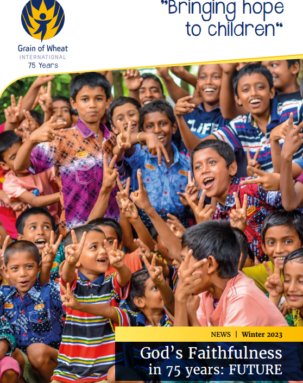



Javier Martín
Director of Grain of Wheat Spain
Some weeks ago, my youngest son told me that he remembered, and was grateful, for my readings before sleeping, when he was a child. They were about the Bible, but Narnia Chronicles and other stories too. He added that those readings stimulated him not only to read but to dream and to become a creative person.
So, when I think on this, 3 words come to my mind: Bible, God and freedom. I’m persuaded that God wants to have a personal meeting with every child, in freedom. This must be the goal of sharing and recommend the Bible to be read by or with children.
In Deut. 6th, we can read how the God of Israel commissioned every father to share God’s words at home, in the way, in the morning, at night, in meal time…in every ordinary situation, because God is always there, with us, and God minds everything.
Jesus himself gave a radical turn to the traditional aim of reading and study the Scriptures. In John 5:39 and 40, he invited Jewish religious people to check and read the Bible indeed, but not with a religious aim (just memorizing or repeating), but to meet with God in a real, fresh and deep way, let’s say spiritually, as he had told before to the Samaritan lady.
Now, thinking in the development and discovering process of children, let’s focus on the link between Bible and kids through reading.
In the early childhood, kids don’t read, just feel, listen and watch. They can’t even understand the words that parents read to them, no matter that they come from the Bible or from other books. But they can see, feel and perceive in their parents’ eyes, face and voice the peace, love and faith within what they are reading. Babies can connect with those feelings, in a positive atmosphere. Family faith is the foundation of children faith, preparing their hearts for the next steps of faith, discovering and understanding.
In the next stage, kids need to discover by themselves. The sense of wonder is there, inviting them to link with the faith of the parents and the church. They have questions and need not only answers but somebody who listens to each of those questions, as God does. Reading the Bible is not just something that others do for the child, but something that the child himself can do, as an adventure to discover the living God talking to and with the child in the middle of his child’s life.
Then, the teen age arrives, earlier than normally expected. The “child” approach of life comes into a deep crisis. “Adult” life is knocking at the door. Their bodies, minds and spirits need to grow, to explore, to become themselves, very often out of their families, and from their childhood reference group. And their faith needs to grow either, normally by being challenged by real life. So, the questions are not the same than in childhood, the answers neither. Reading the Bible, or deciding not to read it more, must be under the premise of free decision, not by imposition. Only a gentle and wise approach from others seems to be relevant to kids in crisis time. But God is still speaking to them, words of love, acceptation and tenderness. May we be there to suffer with them? To read them those words from God? To listen as God listens?
Children feel, listen and experience the Word of God in a quite different way than the adults. Jesus told us about that and advised us too to learn from children and the way that they face God’s Kingdom, the way that they listen, read, ask and trust God in the Bible and in life. God’s Word is the grain. We, the adults, are both, the fields and the sowers. But kids are both too, the fields and the sowers to receive and to spread the seed of life.